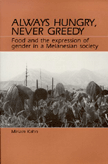“. . . a valuable contribution to Melanesian ethnography, especially in the budding field of cultural constructions of personal identities and gender distinctions.” — Lisette Josephides, Man
“. . . a very good choice for courses on the Pacific, the anthropology of gender, and economic (or ecological) anthropology. It is engagingly written and, by means of a concrete, first-person style, also communicates a great deal about what anthropologists actually do in the field.” — Rena Lederman, Pacific Studies
“Miriam Kahn has pulled off a remarkable feat in this book: she has written an account, in symbolist vein, which manages to be clear, comprehensible, and insightful from start to finish.” — American Anthropologist

187 pages, $26.95 list
0-88133-776-5
978-0-88133-776-1
© 1986
paperback
eBook availability
Always Hungry, Never Greedy
Food and the Expression of Gender in a Melanesian Society
The Wamira people of Papua New Guinea display what outsiders would describe as an obsession with food. Who owns how many pigs, how much taro grows in whose garden, and who contributes what food at a feast, are all questions uppermost in their thoughts. Wamirans account for this preoccupation by saying that they suffer from perpetual “famine.” They explain this by means of an elaborate and colorful myth about Tamodukorokoro, a monster who would have brought them abundant food, but whom, in typical Wamiran style of fearing what they desire, they chased away.
In this carefully crafted and beautifully evocative book, Kahn, who lived with the Wamira people for two and a half years, argues that Wamirans’ “famine” has in fact little to do with the belly. For Wamirans, concepts of food and hunger are cultural constructs. By means of food, they objectify emotions, balance relations between men and women, communicate rivalries among men, and ultimately, control the ambivalent desires that they fear would otherwise control them.
Effectively combining analyses of myths and symbols with analytical accounts of subsistence and ritual behavior, Kahn writes with a degree of nuance that takes the reader beyond academic analyses into the experience of the ethnographer and the daily lives of the people with whom she resided.
In this carefully crafted and beautifully evocative book, Kahn, who lived with the Wamira people for two and a half years, argues that Wamirans’ “famine” has in fact little to do with the belly. For Wamirans, concepts of food and hunger are cultural constructs. By means of food, they objectify emotions, balance relations between men and women, communicate rivalries among men, and ultimately, control the ambivalent desires that they fear would otherwise control them.
Effectively combining analyses of myths and symbols with analytical accounts of subsistence and ritual behavior, Kahn writes with a degree of nuance that takes the reader beyond academic analyses into the experience of the ethnographer and the daily lives of the people with whom she resided.
Reactions
1. Ethnographic Orientations
2. “Sorry My Friend, No Food”
3. “Famine” Reconsidered
4. Tamodukorokoro: The Monster Within
5. Pigs and Pork: The Domestication of Affinal Tensions
6. Taro: The Cultivation of Men’s “Children”
7. Digestion and Reproduction: Parallel Acts of Regeneration
8. The Language of Feasts
2. “Sorry My Friend, No Food”
3. “Famine” Reconsidered
4. Tamodukorokoro: The Monster Within
5. Pigs and Pork: The Domestication of Affinal Tensions
6. Taro: The Cultivation of Men’s “Children”
7. Digestion and Reproduction: Parallel Acts of Regeneration
8. The Language of Feasts